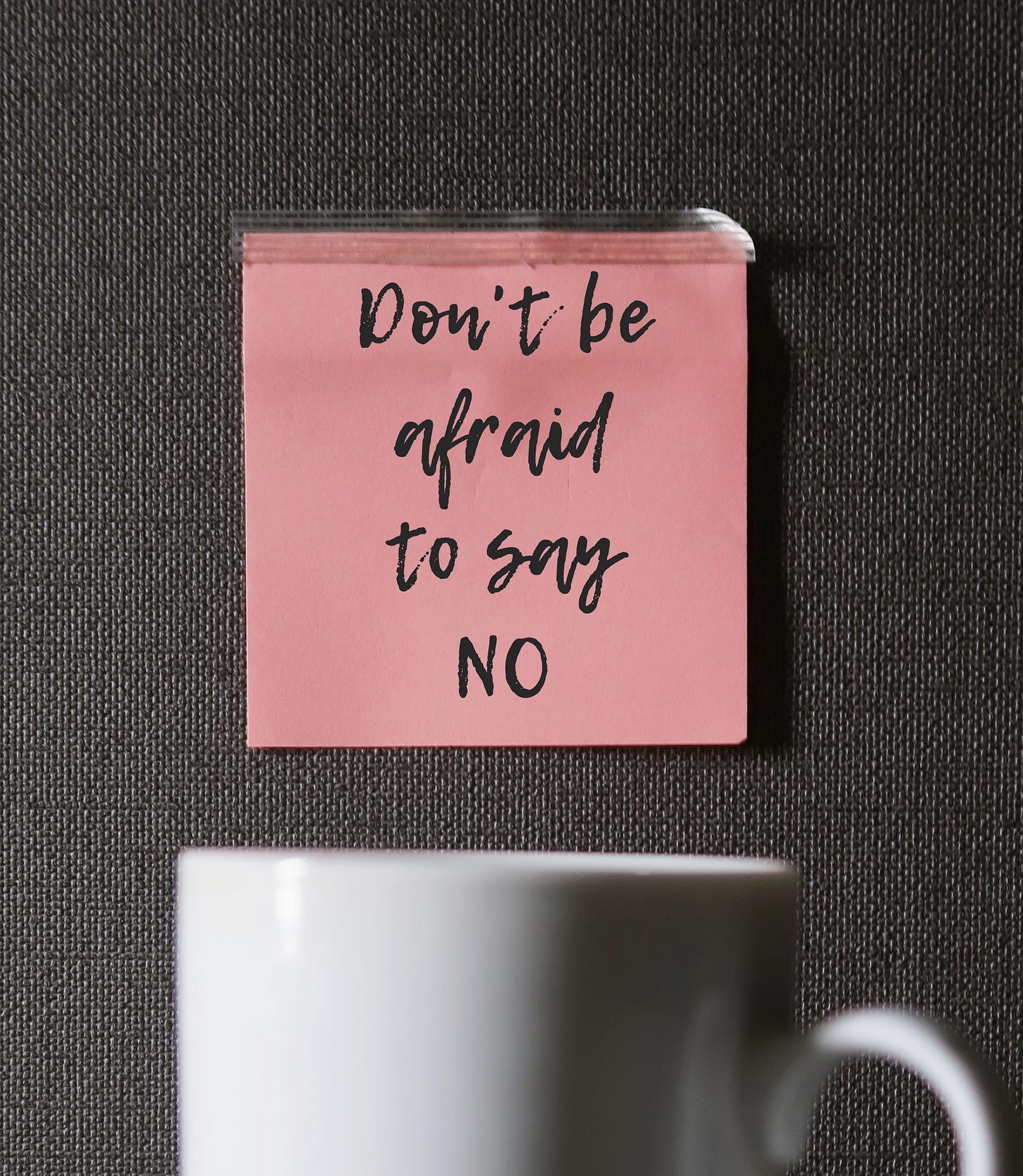On Burnout, Part One
Highly Sensitive People tend to be high performers. We're also more susceptible to stress.
Welcome to my weekly newsletter building a supportive community for Highly Sensitive People.
So many of my coaching clients are saying things like:
“I feel overwhelmed by all the things I have to do.”
“I constantly feel tired, even when I manage to get a full night’s sleep.”
“I don’t feel like I’ve had any time to just stop and process what’s happened in the last few years. I’ve been in survival mode for as long as I can remember. I need space and time alone, but I can’t take my foot off the pedal with kids, work and life.”
“I want to do everything well but right now I feel like I’m not doing anything very well, so I constantly feel like I’m failing.”
“I often feel on edge, irritable and I sometimes shout.”
“I’m procrastinating and putting off all the tasks I know I should be doing.”
“I know I need to prioritise my own wellbeing, but the cultural programming is so strong that any steps toward self-care, or giving myself permission to have a nap during the day, feel like laziness. Even though I know at a rational level that taking care of myself is not ‘doing nothing’, there’s a voice in my head that says it’s not a productive use of my time.”
“I want to say ‘no’ to socialising next week since I’m feeling so drained right now, but I’m worried that I will be judged as antisocial and my friends will give up on me, stop asking me out, and I’ll lose friendships.”
“I don’t want to waste precious time in the day.”
“I put pressure on myself to ‘get it right’ and make the most of my days off.”
“When I give myself 20 minutes of downtime, my mind is so busy, I’m thinking of all the things that I need to do, and so downtime becomes stressful. I feel I’d be less stressed if I tackled my to-do list, rather than sitting around resting or meditating.”1
Burnout alert
If you’re a Highly Sensitive Person (HSP), the chances are that you’ll have experienced at least one episode of burnout.
Though the term might not sound very scientific, the World Health Organisation made burnout an official medical diagnosis in 2019 in recognition of an epidemic of workplace stress. The symptoms include exhaustion; feeling negative or cynical about your role, and reduced efficiency due to chronic pressures in your job.2
Although burnout — strictly speaking — refers to work stress, I have also coached many clients affected by a form of burnout in other areas of their lives, especially during the pandemic. Parenting; caregiving; relationships; finances — so many people are facing crises in one or more area, or questioning their direction in life.
Clearly, burnout is not just an individual matter — it’s a systemic problem in societies where millions of people are being forced into increasingly precarious work, corporations treat people as expendable resources, and global crises from pandemics to climate change and political polarisation are rapidly reshaping our lives.
I believe HSPs have critical roles to play in tackling all these problems — but we can’t do that if we’re burning out. So I thought I’d devote the next couple of newsletters to this topic — focusing on changes we can make in the here and now. Next week, I plan to offer practical tips for manging your energy. But let’s start by exploring some of the factors that can leave HSPs particularly vulnerable.
Overstimulation
Anyone can suffer burnout, but HSPs feel the effects of stress more acutely because of the way we’re wired. Our detail-oriented minds tend to over-analyse all the subtleties we notice — often running endless loops that keep us awake at night. Our “inner critic” is always at the ready — generating feelings of guilt, failure, self-blame, shame, fear and worry with its endless negative commentary.
This stress doesn’t just live in our minds — it seeps into our bodies. HSP nervous systems process sensory input deeply, meaning that levels of noise, chatter, lighting and clutter that don’t bother most people can push us to our edge — leading to viscerally uncomfortable sensations at our core. When we don’t get enough downtime, we can soon start to feel overwhelmed and exhausted.
Before you know it, you’re feeling some combination of tired, trapped, drained, helpless, cynical, disconnected or numb. Burnout beckons.
People pleasing
Another big reason why so many HSPs burn out is our struggle with the word “no.”
Maybe we’ve been asked to take on some extra work, even though we’ve dropped to part-time hours; or we answer the phone when we’d promised ourselves some downtime; or we agree to a friend’s lunch invitation on precisely the afternoon we’d booked to spend catching up on long-overdue admin.
I think there’s a number of reasons why HSPs so often engage in people pleasing of this kind:
We’ve all felt intense disappointment at hearing “no” ourselves at some point — and our high levels of empathy mean we want to spare others the same hurt.
We crave deep, meaningful connections — meaning we’re reluctant to risk upsetting friends or colleagues for fear of harming relationships.
We can feel intense emotion if we perceive that we’re being rejected, abandoned or judged — so we’ll compromise to stay safe.
Our upbringing or culture taught us that being “good” meant complying.
We find ourselves falling into co-dependent relationships as a result of patterns in our early life — meaning we sacrifice our own wants, needs and desires to appease our romantic partners, friends or bosses.
We want to be kind, caring and helpful, but it’s impossible to maintain healthy boundaries or prioritise our well-being when we’re being too “nice.” In the workplace, this can mean people start taking advantage of us — which will soon take a toll.
Conflict avoidant
Conflict is another area which many HSPs prefer to avoid.
Given that it can take us days to process the emotions that may come up during an argument, it’s not surprising that many of us conclude that it’s better to simply take on extra work rather than risk asserting ourselves.
We might tell ourselves we’re just being a good team player, and that every job will have bits that we don’t like. But people pleasing doesn’t serve us in the long-run. If we fail to prioritise our own needs, and then stuff down the resulting resentment, we’ll be at even greater risk of burnout.
Toxic teams
Our tendency to absorb others’ emotions means we’re particularly susceptible to burnout in teams with toxic dynamics, a point author David Robson made in an article on HSPs in the Guardian last week:
“Even if they are not bullied themselves,” Robson writes, “HSPs will find their mood more easily shaken by the negative vibes around them.”
Nevertheless, Robson points out that in a nurturing environment, greater sensitivity can be a real advantage. There’s some evidence that HSPs are better at reading implicit patterns that others wouldn’t see — a useful trait in many roles. And our empathy can make us better listeners and team players.
Great expectations
Some of my HSP coaching clients have very high expectations of themselves, and push themselves far harder than is healthy — a pattern I recognise from my early days as a psychologist (more on that below). They struggle to prioritize their own needs, feel selfish if they take a day off, and are critical of themselves when they don’t manage to get everything done. Self-care is put off until they feel completely on top of all their work – a day that never comes.
Striving for excellence is great provided your health doesn’t suffer. But it’s draining if your self-worth is based on meeting excessively high standards; you struggle with self doubt; compare yourself to others and never feel “good enough.”
It’s helpful to consider that perfectionism can be a trauma response. If we didn’t feel safe in early life, we may have unconsciously adopted perfectionism as a form of protective armour against parental disapproval. Being “perfect” became a strategy to keep feelings of vulnerability and shame at bay.
That quest for control is an illusion. Constant striving cuts us off from our innate sense of what is really right for us in any given situation. We need to remember to take the time to tune in and ask ourselves whether we’re running our lives according to old conditioning — or whether we can strike a healthier balance.
Always on
Our culture rewards being always on the go. We’ve all been taught that being busy equals productivity, and that constant activity is a marker of our value, and leads to success.
The pandemic allowed many of us to slow down and re-evaluate our lives — and some people decided that they didn’t want to return to their treadmill. Nevertheless, being busy is so deeply engrained that we can still perceive rest as being “lazy” or “unproductive.”
Being busy does not necessarily mean we are focused or creating quality work. In fact, research suggests that we need periods of doing very little for our brains to generate creative breakthroughs.
Asleep on the tube
I can recognise all of the above at work in my own life at one time or another.
My biggest burnout experience occurred when I was a newly-qualified clinical psychologist working full-time for the National Health Service. After studying non-stop for years, I was very conscientious (a classic HSP trait) — as well as eager to make the most of my social life, having just moved to London. I knew I had boxed up the grief I was carrying after losing a succession of friends and family members during my studies, and told myself I’d make time to work through it — one day.
Meanwhile, I began to notice that I was having trouble sleeping; my mind was constantly whirring; and I was drinking too much and not eating the right things. I eventually had to admit that I was pushing myself too hard when I began to fall asleep while standing upright in packed rush-hour tubes.
Collective problem
When we’re suffering in this way, we can’t think straight. We blame ourselves for feeling low. We get caught up in our own lives and lose sight of the fact that millions of people are burning out not because there’s anything wrong with us — but because we’re stuck in unhealthy work environments that are themselves features of a fundamentally unsustainable global economic system.3
I created The HSP Revolution because I believe HSPs have precisely the qualities needed to drive the collective changes needed to build a saner and fairer future — but we can only do this if we’re well.
Next week, I’ll be looking at some practical ways we can keep ourselves balanced. As always, I love to hear how you’re getting on in the comments.
Until next time,
These are composites I invented to give a general flavour of what I’ve been hearing in client work, rather than verbatim quotes from individuals.
Doctors are encouraged to rule out other conditions such as depression or anxiety before diagnosing burnout.
For an excellent discussion of how depression and anxiety relate to these systemic issues, I recommend Lost Connections: Why you’re depressed and how to find hope, by Johann Hari.








I’ve experienced burnout trying to accomplish projects which left me feeling drained leading to time off work.
I’ve been a people pleaser in the past, however saying no is becoming easier and is an act of self care!
I just have to thank you, dr. Genevieve!
What you teach us is the necessary complement of what was written in the Temple of Apollo in Delphi: "Know yourself".
I always tried to know myself, but it lacked me a way to it.
Thank you again!